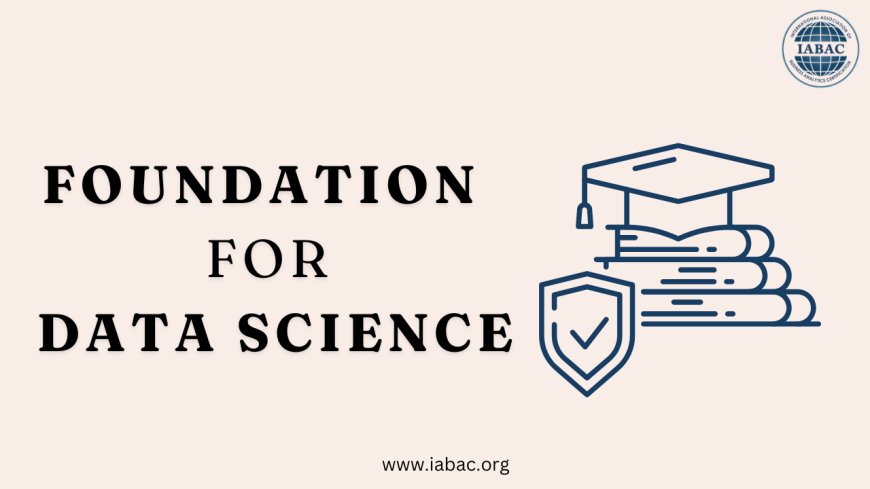Foundation for Data Science Success
Discover how to succeed in Data Science with a strong foundation. Learn practical strategies, tools, and skills for mastering Data Science effectively.

Data science is an interdisciplinary field that uses scientific methods, processes, algorithms, and systems to extract knowledge and insights from structured and unstructured data. It blends various elements from statistics, computer science, and information science to analyze data and generate actionable insights. This field primarily aims to help companies and organizations make better decisions and improve their operations through data-driven approaches.
The practice of data science involves preparing data for analysis, developing algorithms, and creating data models. This process not only helps in uncovering hidden patterns within the data but also aids in predicting future trends and behaviors, allowing organizations to proactively develop solutions. As the volume of data continues to grow exponentially, the role of data scientists becomes ever more critical in helping businesses understand and leverage data to achieve their strategic goals.
How can beginners overcome initial learning hurdles?
Beginners in any field sometimes confront obstacles due to novel concepts and a steep learning curve. To overcome these early obstacles, it is critical to begin with core knowledge and progressively progress to more difficult topics. An organized learning path, which may include online courses, textbooks, or seminars, aids in ensuring consistent advancement. Regular practice is essential; hands-on projects or exercises can help reinforce information and increase confidence. Joining a group or finding a mentor can also be beneficial because these resources assist, answer questions, and provide insights from their own experiences. Finally, setting reasonable goals and sticking to a regular study routine will help you manage the learning process without feeling overwhelmed. This method ensures a firm foundation of information and abilities, making the learning
How Can One Build a Strong Foundation in Data Science?
Building a strong foundation in data science is crucial for effectively handling and analyzing data in various professional settings. This foundational knowledge encompasses several key areas, each contributing to a comprehensive understanding of the field. Individuals can create a solid data science foundation, enhancing their ability to analyze data and derive meaningful insights across various contexts.
-
Statistical Analysis: Start by mastering statistics, as it is essential for interpreting data and performing quantitative analysis.
-
Programming Skills: Develop proficiency in programming languages such as Python or R, which are fundamental for manipulating data and applying data science algorithms.
-
Data Manipulation and Management: Learn how to preprocess, clean, and manage data using platforms like SQL and Pandas. This skill is vital for ensuring data quality and usability.
-
Machine Learning Techniques: Familiarize yourself with basic machine learning algorithms and principles, which can help in making predictions or automated decisions based on data.
-
Data Visualization: Acquire the ability to present data visually using tools like Matplotlib, Seaborn, or Tableau to communicate findings clearly and effectively.
Discuss the gap between the increasing demand for data science skills and the availability of skilled professionals.
The gap between the growing demand for data science skills and the availability of skilled professionals highlights various factors contributing to this disparity.
|
Increasing Demand for Data Science Skills |
Availability of Skilled Professionals |
|
Rapid growth in data-driven decision-making across industries. |
A limited number of individuals with comprehensive data science skills. |
|
The emergence of new technologies requires specialized knowledge (e.g., AI, machine learning). |
Traditional education systems often lag in providing relevant training. |
|
Companies recognize the value of data in gaining a competitive edge. |
Shortage of professionals with practical experience in real-world data projects. |
|
Expansion of data-centric roles beyond tech companies to sectors like healthcare, finance, and retail. |
High demand for experienced data scientists, leading to fierce competition for talent. |
|
Increasing complexity of data analysis tasks, requiring advanced statistical and programming skills. |
Lack of diversity in the data science workforce, particularly in terms of gender and ethnicity. |
|
Rise in demand for domain-specific expertise alongside technical skills (e.g., healthcare informatics, financial analysis). |
Challenges in retaining talent due to attractive job offers from competitors and startups. |
Data science requires a combination of technical and analytical skills. Proficiency in programming languages such as Python or R is essential for data manipulation, analysis, and model building. A solid understanding of statistical concepts enables effective data interpretation and hypothesis testing. Data visualization skills are crucial for presenting findings and insights clearly and understandably.
Effective Resources and Strategies
Effective resource management is key to achieving goals in any project or organization. Utilizing resources efficiently involves identifying available assets, allocating them wisely, and ensuring their optimal use. This includes human resources, materials, finances, and time. Effective communication and collaboration among team members can enhance the use of these resources, leading to better outcomes. Investing in training and development can also improve the skills and productivity of the workforce, making the most of human capital.
Strategies:
-
Resource Allocation: Assign resources based on the specific needs and priorities of the project, ensuring each task has the necessary support.
-
Continuous Monitoring: Regularly track how resources are being used to identify any areas of waste or inefficiency and adjust as needed.
-
Skill Development: Provide training programs to improve the skills and knowledge of the team, increasing their effectiveness and productivity.
-
Effective Communication: Maintain clear and open communication channels within the team to ensure everyone is aligned and informed about resource usage and project goals.
-
Technology Utilization: Use tools and software designed for resource management to streamline processes and enhance efficiency.
-
Risk Management: Identify potential risks to resources and develop plans to mitigate their impact, ensuring resources are protected and used wisely.
-
Feedback Mechanisms: Implement systems for receiving and acting on feedback from team members to continually improve resource management practices.
Essential Skills for Data Science
These skills are like building blocks for data science jobs. They help people understand data better and make smart decisions based on it. With these skills, professionals can easily find patterns in complicated data and make sense of it for others.
-
Programming: You should be able to use Python or R to work with data and make it easier to understand. This means writing code that's efficient and can handle a lot of data at once.
-
Statistics: Understanding statistics helps you make sense of data. You need to know things like probability, hypothesis testing, and regression analysis to draw useful conclusions from your data.
-
Data Visualization: Being able to create clear and easy-to-understand charts and graphs is important. Tools like Matplotlib, Seaborn, or ggplot2 can help you do this. Good visualization makes it easier for everyone to understand what your data is saying.
-
Machine Learning Basics: You should know the basics of machine learning. This means understanding different algorithms like linear regression or decision trees. You also need to know how to evaluate these models and choose the right features for your data.
Building a solid foundation in data science is crucial for success in today's data-driven world. By tackling the skills gap and integration challenges, individuals and organizations can make better decisions and drive innovation. Key strategies include pursuing education through degrees and online courses, learning essential skills like programming and statistics, and using resources such as textbooks and online platforms. Practical experience through projects and internships is also important. Staying updated with industry trends ensures ongoing growth and adaptability. With a strong data science foundation, you'll be well-equipped to leverage data for meaningful insights and advancements.
































